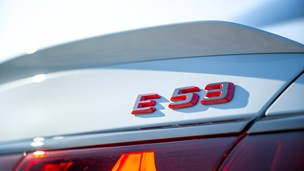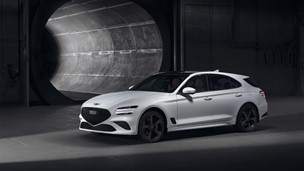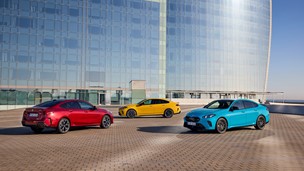The Jaguar XF is the luxury brand’s top-selling model, and is likely to remain so until a BMW 3 Series contender arrives in 2015.
While the recently launched F-TYPE sports car has elevated the brand, the executive saloon XF achieves the big sales, way above those of the XK and XJ.
It was a natural progression that Jaguar would develop an estate iteration, and the XF Sportbrake has added even more practicality to this luxury-looking car. Its main rivals include the BMW 5 Series Touring and the Audi A6 Avant.
The XF Sportbrake certainly has the smart styling to compete with its rivals, and it is offered with a couple of diesel engine options.
Performance
The most popular is the 2.2-litre diesel unit, which can deliver either 161bhp or 197bhp. Sitting at the top of the range is a 3.0-litre V6 diesel with 237bhp or 271bhp.
Fitted with the 237bhp V6, the XF Sportbrake hits the benchmark 0-62mph sprint in a decent 7.1 seconds, with a top speed of 149mph.
The equivalently powered BMW 5 Series Touring 535d is quicker at 5.9 seconds as is the Audi A6 Avant 3.0 TDI with 242bhp at 6.3 seconds.
This car is all about comfort, and is certainly one for long journeys with all the family. But the 3.0-litre engine also provides a pleasing swiftness when you put your foot down, that makes it a little juicier than the standard version.
The eight-speed automatic gearbox is fluid, though suits more gentle cruising opposed to neck-craning acceleration.
Ride and Handling
Essentially, there is a little bit of agility lost for increased ride comfort. On the plus side though, there’s still very little body roll through the corners and supporting the drive is the clever Adaptive Dynamics System which is standard.
The XF Sportbrake displays the usual Jaguar traits of comfort and civility along rough British roads, often outdoing its counterparts in this area. Handling is also fairly good, though you can feel the extra weight over the saloon version, which means it doesn’t steer quite so well out of corners. Essentially, there is a little bit of agility lost for increased ride comfort. On the plus side though, there’s still very little body roll through the corners and supporting the drive is the clever Adaptive Dynamics System which is standard. This feature constantly monitors the suspension and can adjust damping rates up to 500 times a second to keep the ride stable and comfortable.
Interior and Equipment
The Jaguar XF Sportbrake is only the second ever estate which Jaguar has mass-produced. The only previous example was the X-Type Estate.
Essentially, there is a little bit of agility lost for increased ride comfort. On the plus side though, there’s still very little body roll through the corners and supporting the drive is the clever Adaptive Dynamics System which is standard.
Cost
In general, the pricing range for the XF Sportbrake is slightly more expensive than both the BMW and A6 Avant.
Pricing for the Jaguar XF Sportbrake ranges between £31,945 and £51,995, not counting the high-performance XFR-S model. The cheapest V6-powered model is priced at £38,365. In general, the pricing range for the XF Sportbrake is slightly more expensive than both the BMW and A6 Avant. It also loses out on economy and emissions. The V6-powered XF Sportbrake offers official combined figures of 46.0mpg and 163g/km CO2 versus 51.4mpg and 114g/km in the BMW 530d and 47.9mpg and 156g/km in the A6 Avant. With the 2.2-litre diesel, the XF Sportbrake emits between 129g/km and 139g/km. That makes it slightly cleaner than the A6 but the BMW 5 Series Touring offers even greener alternatives.
Our Verdict
The XF Sportbrake might be the most expensive of the favourites, but many will opt for this model thanks to its striking coupe-like estate looks and British heritage. The comfortable and composed drive and lengthy equipment list are other credible reasons to buy this car. In terms of pure speed, agility and costs, however, there are alternatives from illustrious German brands which perform better. It’s also not quite the most practical premium estate car available today. Still, while it might not have the edge on performance or handling, it’s decent enough to hold its own, while offering stunning looks and lots of character.




